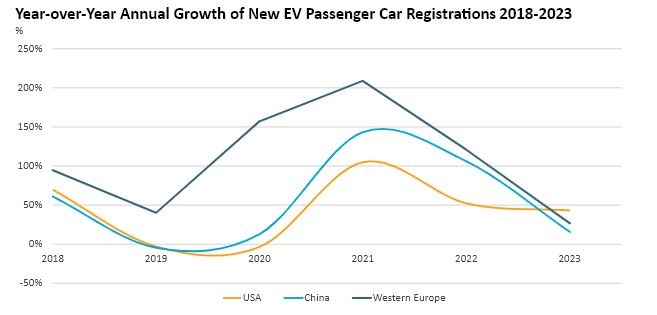
The electric vehicle (EV) market in the UK is facing challenges in 2024, with signs of a downturn becoming more evident. While the government had previously aimed to ban new petrol and diesel vehicle sales by 2030, this deadline has been pushed back to 2035. This delay has created uncertainty for consumers, leading some to hold off on switching to electric cars. Moreover, the government's ZEV mandate, which requires 22% of all new vehicle sales to be zero-emission by 2024, is facing difficulties as the UK struggles to meet this target
EV sales are also being impacted by rising costs of living and a decrease in government incentives, making the transition to electric vehicles less financially attractive to many consumers. At the same time, competition from hybrids and uncertainties regarding charging infrastructure have further slowed the market. Tesla, which had been a strong player, is facing increased competition and has experienced a drop in market share
In addition, new tariffs on imported vehicles, particularly from China, are expected to impact the availability and cost of EVs in the UK, which could further dampen growth
Despite these challenges, EV adoption is still seen as essential for meeting the UK's net-zero goals, though the current downturn is raising concerns about the pace of this transition.

Volvo recently revised its ambitious plan to exclusively sell electric vehicles (EVs) by 2030, opting instead for a more flexible strategy that includes plug-in hybrids alongside fully electric models. This shift comes amid a broader industry slowdown in EV demand, driven by challenges such as inadequate charging infrastructure, rising vehicle costs, and the reduction of government incentives in key markets like the UK and US. Volvo's retreat mirrors decisions by other automakers like Renault and Mercedes-Benz, who are also reevaluating their EV timelines due to similar market pressures.
Volvo still plans to electrify the majority of its fleet but now aims for 90-100% of sales to be either plug-in hybrid or fully electric vehicles by 2030. The company has cited fluctuating consumer interest, supply chain difficulties, and the complex regulatory environment as reasons for this shift. While sales of electrified vehicles have increased in Europe, Volvo has seen mixed results globally, with significant sales drops in China and the US.
Despite this retreat from its original all-electric goal, Volvo remains committed to reducing its carbon footprint and has set ambitious emission-cutting targets for the coming years
